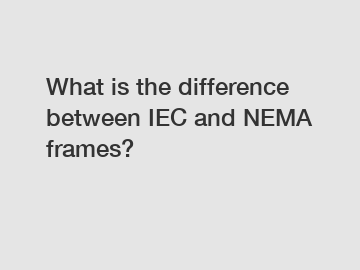What is the difference between IEC and NEMA frames?
Apr. 05, 2024
What is the difference between IEC and NEMA frames? When it comes to electric motors, the frame size is a crucial factor in determining compatibility with different components and applications. The International Electrotechnical Commission (IEC) and the National Electrical Manufacturers Association (NEMA) have set standards for motor frame sizes, but there are significant differences between the two.
IEC frames are based on metric measurements, with frame sizes ranging from 56 to 400. These frames are usually designated by a letter code followed by numbers that indicate the shaft height and foot mounting dimensions. In contrast, NEMA frames are based on imperial measurements, with frame sizes ranging from 42 to 449. NEMA frames are designated by a number that corresponds to the shaft height in sixteenths of an inch.
The differences between IEC and NEMA frames extend beyond just the measurements. IEC frames tend to be more compact and lightweight compared to NEMA frames, making them ideal for applications where space and weight are limited. On the other hand, NEMA frames are known for their robust construction and durability, making them suitable for heavy-duty industrial applications.

The decision to use either IEC or NEMA frames often depends on the specific requirements of the application. For example, if space is a constraint, an IEC frame may be preferred due to its compact size. However, if the motor is expected to endure harsh operating conditions, a NEMA frame may be more suitable.
In addition to size and construction differences, IEC and NEMA frames also have implications for motor performance and interchangeability. Motors with different frame sizes may not be interchangeable, as the mounting dimensions and shaft heights may not align. It is important to carefully consider the frame size when selecting a motor for a specific application to ensure compatibility with other components.
Overall, understanding the differences between IEC and NEMA frames is essential for selecting the right motor for a given application. By considering factors such as space constraints, operating conditions, and interchangeability, engineers and designers can make informed decisions that maximize motor performance and reliability. Whether using IEC or NEMA frames, adherence to the appropriate standards will help ensure that the motor operates efficiently and safely.
Contact us to discuss your requirements of Windings for Synchronous Motors, Applications of Three Phase Induction Motor, Difference Between 1 Phase and 3 Phase Induction Motor. Our experienced sales team can help you identify the options that best suit your needs.
47
0
0


Comments
All Comments (0)